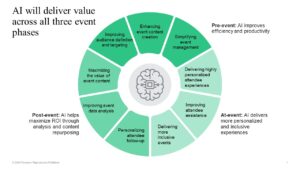Marketers Must Embrace AI To Maximize B2B Event Success
Marketers Face Long-Standing Event Planning And Execution Challenges
In the ever-evolving landscape of B2B marketing, events continue to dominate marketing program spend. But many event marketers struggle to fully capitalize on the value of their investments due to long-standing challenges. The good news is that the future holds immense potential for leveraging artificial intelligence to overcome these obstacles and unlock new opportunities.
One of the key challenges faced by marketing teams is the underutilization of event content. Despite creating high-quality content for events, valuable resources often go to waste once the event concludes. A significant 63% of marketers admit that they fail to maximize the value of event content, with large enterprises facing an even higher figure of 72%.
Another challenge lies in maximizing the value of event data. With restricted access to audience data becoming increasingly common, event data is a valuable source of zero- and first-party audience insights. Unfortunately, 55% of marketers confess that they are failing to extract the full potential of this data. Personalization is yet another hurdle for event teams. Next-generation attendees, particularly Gen Y and Z, expect events to provide digital and personalized experiences. A majority of marketers, however, confess that this is an area they’re struggling with.
AI Will Help Marketers Overcome Challenges And Maximize Event Value
Current adoption of AI for B2B events is low, with 87% of marketers saying they’re in learning mode, but a majority believe that AI will fundamentally transform how they plan and execute events within the next 24 months. In upcoming research, I’ve identified nine priority event use cases for AI across the three event phases of pre-event, at-event, and post-event:

- During the pre-event phase, AI can enhance productivity and efficiency by refining audience targeting and selection. By leveraging data analysis and predictive intelligence, marketers can ensure that their event reaches the right audience. Additionally, AI can streamline event content creation and simplify event management processes, saving time and resources.
- At the event itself, AI can deliver highly personalized and inclusive experiences. Through deep analysis of attendee data, AI can provide personalized recommendations and unique event journeys. AI-powered chatbots can deliver enhanced levels of assistance, while areas such as AI captioning and translation will deliver more inclusive experiences.
- In the post-event phase, AI can help maximize ROI through data analysis and content repurposing. AI-powered tools can help marketers get quick answers to complex questions that were previously out of scope for all but the most data-savvy event teams. Furthermore, AI can simplify the process of reusing and repurposing event content, enabling marketers to extend the life span of their content and deliver it to a wider audience.
By embracing AI, marketers can overcome long-standing challenges and unlock new opportunities through their events. AI improves event team productivity, delivers enhanced attendee experiences, and helps maximize event value.
Forrester clients can access the new report, Reimagine B2B Events With AI, and request a guidance session or inquiry to dive deeper into this topic.
